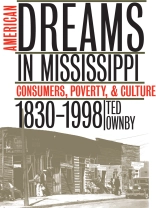The dreams of abundance, choice, and novelty that have fueled the growth of consumer culture in the United States would seem to have little place in the history of Mississippi–a state long associated with poverty, inequality, and rural life. But as Ted Ownby demonstrates in this innovative study, consumer goods and shopping have played important roles in the development of class, race, and gender relations in Mississippi from the antebellum era to the present.
After examining the general and plantation stores of the nineteenth century, a period when shopping habits were stratified according to racial and class hierarchies, Ownby traces the development of new types of stores and buying patterns in the twentieth century, when women and African Americans began to wield new forms of economic power. Using sources as diverse as store ledgers, blues lyrics, and the writings of William Faulkner, Eudora Welty, Richard Wright, and Will Percy, he illuminates the changing relationships among race, rural life, and consumer goods and, in the process, offers a new way to understand the connection between power and culture in the American South.
A propos de l’auteur
Ted Ownby is associate professor of history and southern studies at the University of Mississippi. He is author of Subduing Satan: Religion, Recreation, and Manhood in the Rural South, 1865.












